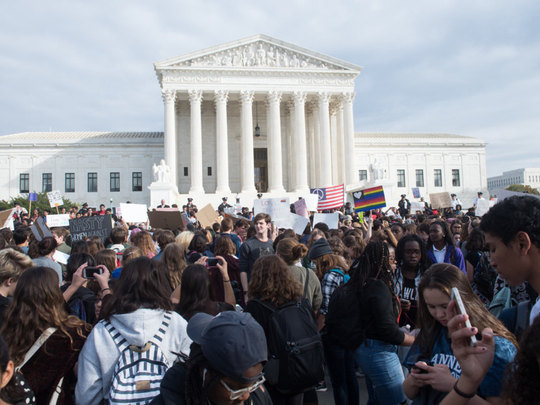
This year’s American presidential election cycle broke quite a few records in terms of campaign spending, but perhaps the most disturbing trend is the rise in spending to elect state-level judges. The Brennan Center for Justice reports that spending by outside groups for state Supreme Court races reached an all-time high of about $20 million (Dh73.56 million) this year, a 44 per cent increase from the 2012 cycle.
I’m not typically the kind of person who you would find complaining about campaign spending, mostly because I’m not convinced that political ads really have that much of an effect on voters (case in point, the 2016 presidential election). But the fact that judicial elections look more and more like other legislative elections illustrates a dangerous trend: The politicisation of America’s court system.
This is a problem for a host of reasons beyond the obvious potential for corruption and bias on state Supreme Court benches. The politicisation of America’s legal system engenders a toxic mindset that prioritises partisan policy gains — such as gun or abortion rights — over the preservation of law. And what’s terrifying is that even though federal court positions aren’t elected positions, they’ve become infected with similar partisan rancour.
Alexander Hamilton and his fellow constitutional designers were abundantly clear that they didn’t want judges to be popularly elected. The Framers were deeply sceptical of direct democracy and feared that elections would threaten the independence of the courts from political factions. Too much outside pressure would likely encourage judges to make decisions that would keep them in power rather than provide a check against the other branches of government.
Judicial elections became popular in the 19th century, particularly when Mississippi instituted popular judicial elections in 1832. Even then, Mississippi judges were wary of the changes, criticising the elections as “subject of ridicule in all the states where it is known” and as the “full definition of mobocracy”.
The legitimacy of America’s courts is based solely on the public’s trust in the law — and that’s a fragile thing. As pundits have noted elsewhere, judges don’t have the power to tap into federal funds or to deploy the national military. Without the public’s trust in the court’s power, it becomes easy for a democracy’s executive to ignore their rulings. Indeed, we’ve seen this at various points in American history.
It’s obvious today that America’s court system is increasingly politicised, however much we may dislike this fact. (There’s a reason why so many people were upset when Justice Ruth Bader Ginsburg criticised President-elect Donald Trump prior to the election.) And if we’re being completely honest, it’s difficult to deny that the Supreme Court has become a popularly elected institution — much against America’s founders’ wisdom. Senate Majority Leader Mitch McConnell (Republican from Kentucky) and House Speaker Paul Ryan (Republican from Wisconsin) both openly declared that they wanted the 2016 election to become a national referendum of sorts to give voters a “voice” in the nomination of the next Supreme Court justice. Sixty-five per cent of registered voters had listed Supreme Court appointments as “very important” for this year’s election.
Back in the final presidential debate of 2008, then-presidential candidates John McCain and Barack Obama tiptoed around what they would want out of a Supreme Court justice, but both affirmed the norm that there shouldn’t be any form of litmus test to measure the qualifications of a Supreme Court nominee. Jump only eight years later to the final presidential debate between Hillary Clinton and Trump, and both candidates are not only endorsing litmus tests for judges, but also specifically listing the key policy issues that would serve as qualifying factors for their judges.
Half a century ago, Supreme Court justices literally drove themselves to the brink of insanity fretting over whether their decisions were stepping too deep into the “political thicket”. We’re a far cry from then, especially as courts increasingly are seen as a policymaking tool for political operatives on both sides of the aisle. In this context, the brouhaha surrounding Merrick Garland’s nomination to the Supreme Court shouldn’t be surprising. In fact, it should be expected.
This is a sign that the system of checks and balances that America’s Founding Fathers imagined is desperately ill. The courts face a troubling crisis of independence and it seems to be encouraged — if not driven — by pressure from electors. Americans need to take a step back and really reconsider what role voters should be playing in the courts. The greatest injustice in the legal system may end up being the dishonour Americans do to their constitutional design.
— Washington Post
Robert Gebelhoff is an opinion writer









